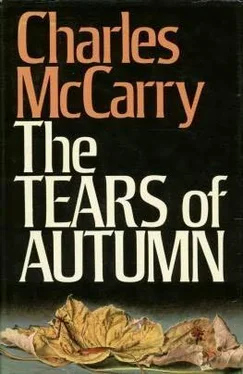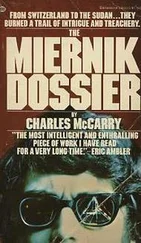“In the fifties, as you know, I was at the UN under deep cover as a Tass correspondent,” Klimenko said. “Mostly I handled Latin Americans-they’re easy, because they like women. Sometimes an African. My targets were all non-American, except one. I had a primary assignment targeted on a certain American group. The Latinos and the blacks were make-work. The American target was very, very difficult. I only made the recruitment three months before I was posted to Western Europe.”
“And you handed over the American asset when you left New York in 1956?”
“No, there was no handing over. I made the recruitment and told the man to go fictitious until we made contact again. It wasn’t really a recruitment. I didn’t tell him anything about his employers. We didn’t have him under discipline. He was an American patriot, he would have shot me if he had known I was a dirty Communist spy.”
“What did you tell him?”
“That I represented a group in Belgium that might need work done in America. That my name was Blanchard. That the fee would be high. That he might not hear from us for years, but when he did, we’d expect action in whatever period of time we specified. I told him it might be as short a period as twenty-four hours.”
“How did you bind the recruitment?”
“I gave him one hundred thousand dollars as a retainer. We wanted him to know we were serious.”
“How did you set up the future contact?”
“Telegram and meeting. I rented a safe house in Chicago and put two unwitting people in it. The agent had the address. When he got a telegram from Naples saying, in Italian, that his uncle Giuseppe had died, he was to go to the safe house at 10:18 on the next night after the day of the week mentioned in the telegram as the day of his uncle’s death.”
“10:18-that sounds authentic,” Christopher said. “Why do you people split the clock that way?”
Klimenko was annoyed by the digression. “It’s just technique, it’s supposed to discipline agents. In czarist days no one could tell time in Russia. After the revolution, people were shot for being late. It was part of the pattern of changing everything, making a new society.”
“Who was the agent?”
“I told you it was a difficult target,” Klimenko said. “It took me three years to make contact. I wasted time. I should have realized their security is almost the same as ours. All clandestine organizations are more or less alike. When I did, I went in with almost no trouble, after I’d established my cover with them.”
“Who?”
“Franco Piccioni. He’s called Frankie Pigeon.”
“What is he?”
Klimenko laughed. “You have lived abroad for a long time, Paul. Think. What would someone called Frankie Pigeon be?”
“Mafia.”
“Yes, Chicago. Frankie is an important American.”
“But why? What would you need with him? You’ve got all the guns you need.”
“You never have all the guns you might need. You know how it is. One of the bolshoy chirey has an idea-do you know what that phrase means? The big boils-that’s what we call our senior officers, as if they will burst at any moment. It tells you something about the KGB. Anyway, someone had an idea in Moscow. I carried it out in the field. It was a contingency plan. Maybe someday they’d need a clean killing in the States. Then they’d have a man.”
“But it was insecure.”
“The Mafia is insecure? No one has ever convicted Frankie Pigeon of anything. It was compartmented very tightly. Frankie didn’t know who we were. He likes money, a little on the side. It wasn’t easy to find a man like Frankie-most of these gangsters won’t deal with outsiders.”
“How often did you use him?”
“Never, unless we used him last month. The idea all along was to employ him on a one-time basis against a target we couldn’t reach. He’ll never be used again.”
Klimenko was shivering violently, and Christopher felt the cold seeping through his own raincoat.
“Really, we must get under cover,” Klimenko said. “It’s getting light.”
“What was Pigeon used for?”
“That I don’t know. But consider the sum involved. Consider the date.”
“I have,” Christopher said.
“I can give you a piece of hard information, Paul. Frankie Pigeon is a sentimental man. He always spends the twelve days of Christmas in the village of Calabria where he was born. He brings his wife and children with him on Christmas Eve and stays until January 7.1 can show you on a map where he’ll be.”
“You can show me in the car,” Christopher said.
Sitting in the front seat beside Christopher, Klimenko drew a sketch of the roads leading to Frankie Pigeon’s house in the hills above Catanzaro. on the toe of the Italian boot. He handed it to Christopher.
“He takes two men with him,” he said. “I don’t know what their security arrangements are. He likes to hunt rabbits in the early morning and talk with the farmers in the evening. He goes for walks before dinner.”
“I thought you said you didn’t keep in touch.”
“I kept myself informed.”
“Is there anything else about this man Pigeon-as a person, I mean?”
“The weakness?” Klimenko said. “He’s a snob-he’s been bilked of thousands by genealogists attempting to prove that his mother’s family, the Cerruti, are bourgeoisie from the north of Italy; but all the Cerruti are Sicilian from way back, shepherds and shoemakers. That’s of no use to you.”
“Then tell me something that is useful.”
“Frankie Pigeon is a hypochondriac. He’s morbid about germs-washes his hands all the time. He has a servant who spreads sterilized towels over the floor for him to walk on in hotels. He boils his coins before he touches them, won’t handle paper money at all because of the danger of disease. You recognize the pathology-it’s common enough in murderers.”
The bleak shape of Monte Testaccio loomed above the car, with a cross mounted at its summit. “What’s the name of that hill?” Klimenko asked.
Christopher told him. “It’s made entirely of pottery-the jugs the ancient Romans used to transport wheat and honey from the eastern Mediterranean. It will appeal to your Leninist sense of irony that the Monte Testaccio, a dump, is the only remaining trace of the common people of the Roman Empire.”
Klimenko laughed, coughed, and covered his mouth. “What are the arrangements?” he asked.
Christopher gave him an address and a key. “Be ready at five o’clock, precisely on the hour. The man who comes will say his name is Edward Trelawny. You’ll reply, ‘Do you still have Shelley’s heart?’”
“Almost twelve hours. Can’t it be sooner?”
“No. One last thing, Gherman-don’t talk to anyone else about Frankie Pigeon for fourteen days. Then you can spill it.”
Klimenko was swiveling his head, watching the approaches to the car.
“Do you understand?”
“Yes. I’ll tell your friends on January 6. There’ll be no trouble filling the time with other things, Paul.”
Christopher began to talk while Molly was still in the room. Tom Webster gave her a cold stare and held up his palm.
Molly smiled and said, “Tell me the etiquette, Mr. Webster.”
“Tom would feel more comfortable if you went into the bedroom and read a book,” Christopher said.
When the door had closed behind Molly, Webster said, “What does she know?”
“That I’m a retired agent. She had to know what she was involved in, so I told her. She took the call from Klimenko, but she doesn’t know his name or what he is.”
“Klimenko?”
“That’s what I have for you, Tom-Gherman Klimenko. He wants to defect.”
Читать дальше












